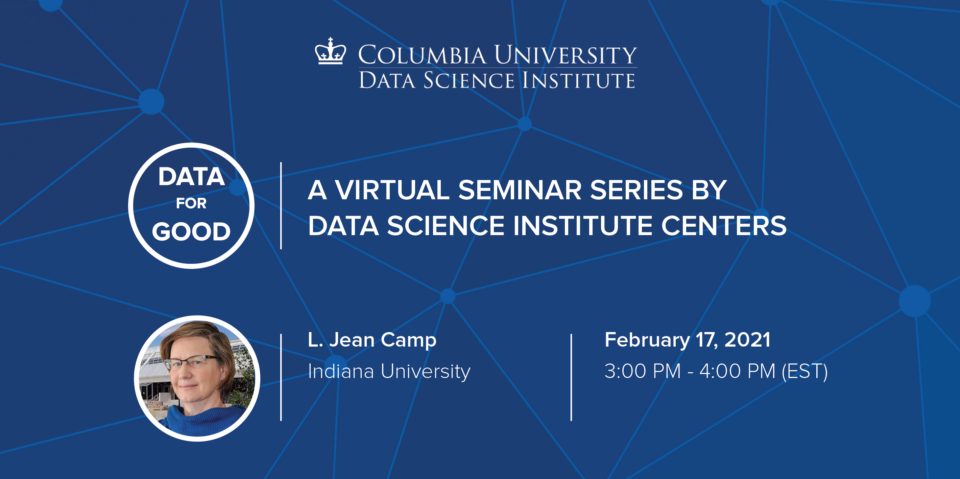Data for Good: L. Jean Camp, Indiana University
Wednesday, February 17, 2021
3:00 pm - 4:00 pm


Hosted by Data Science Institute Centers, Data for Good seminars address societal challenges and bring humanistic perspectives to science and technology.
L. Jean Camp, Professor of Informatics & Computer Science, Indiana University
February 17, 2021 (3:00 PM – 4:00 PM ET) – Online Event
REGISTER HERE
DSI Cybersecurity Center in conjunction with Barnard Computer Science
Reckoning with Routing: An Interdisciplinary Approach to Understanding Internet Control Plane Attacks
Abstract: Securing Internet routing against anomalies requires building approaches that are effective against intelligent actors who control a part of that network. Routing anomalies are detected on the order of tens of thousands of time a year hidden in a network described by a constantly updated routing table of a million entires. Such anomalies may be accidents, but there is anecdotal evidence that indicates criminal intent. There are also case studies that illustrate the use of these for national intelligence. Any given anomaly could be an accident, a crime, or an attack. Although it is impossible to directly observe the motivation of those who generate these anomalies, aggregate data about the sources of these anomalies is available. Here I report on the use of tools of macroeconomics to provide insights into the possible nature of these anomalies. The results of linear regression shows support for the possibility that anomalies are driven by crime, specifically for the guardianship and relative deprivation theories of crime. In addition to these findings from regression analysis, clustering indicates that civil conflict and surveillance are associated with a disproportionate origination of routing anomalies. This examination motivated further investigation into the efficacy of blocking based on jurisdictions of autonomous systems. An examination of global financial institutions offer a promise that this may not be disruptive under normal conditions. Most recent results show that large-scale disruptions can be identified and mitigated before widespread diffusion of malicious announcements by measuring only the time between announcements (depending on the location of the attack and the detector).
Bio: L. Jean Camp is a Professor at the School of Informatics and Computing at Indiana University. She is a Fellow of the Institute of Electrical and Electronic Engineers. She is a Fellow of the American Association for the Advancement of Science. She joined Indiana after eight years at Harvard’s Kennedy School where her courses were also listed in Harvard Law, Harvard Business, and the Engineering Systems Division of MIT. She spent the year after earning her doctorate from Carnegie Mellon as a Senior Member of the Technical Staff at Sandia National Laboratories. She began her career as an engineer at Catawba Nuclear Station with a MSEE at University of North Carolina at Charlotte.
Her research focuses on the intersection of human and technical trust, leveraging economic models and human-centered design to create safe, secure systems. Her early contributions in the interdisciplines of economics of security, user-centered security, risk communication, and online trust underlie her applied research in the domains of IoT, authentication, secure networking, ecrime, public policy, ethics in computer science, and a few works on applied cryptography. Full text and details on her publications can be found at their disciplinary homes, meaning that there is no complete overlap between Research Gate, DBLP , SSRN, and Google Scholar. Works sorted by domain and discipline are also available at http://www.ljean.com/publications.php.